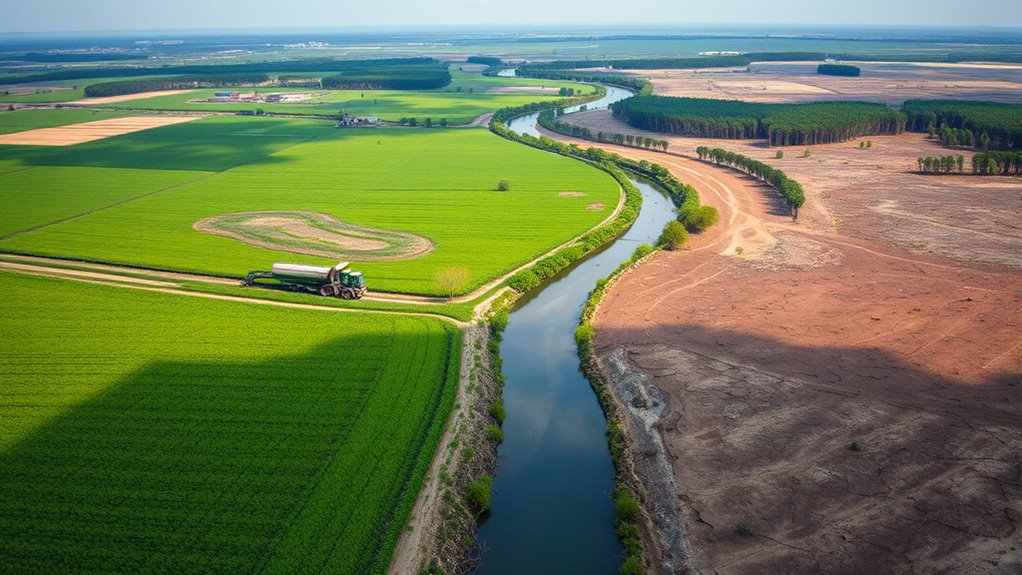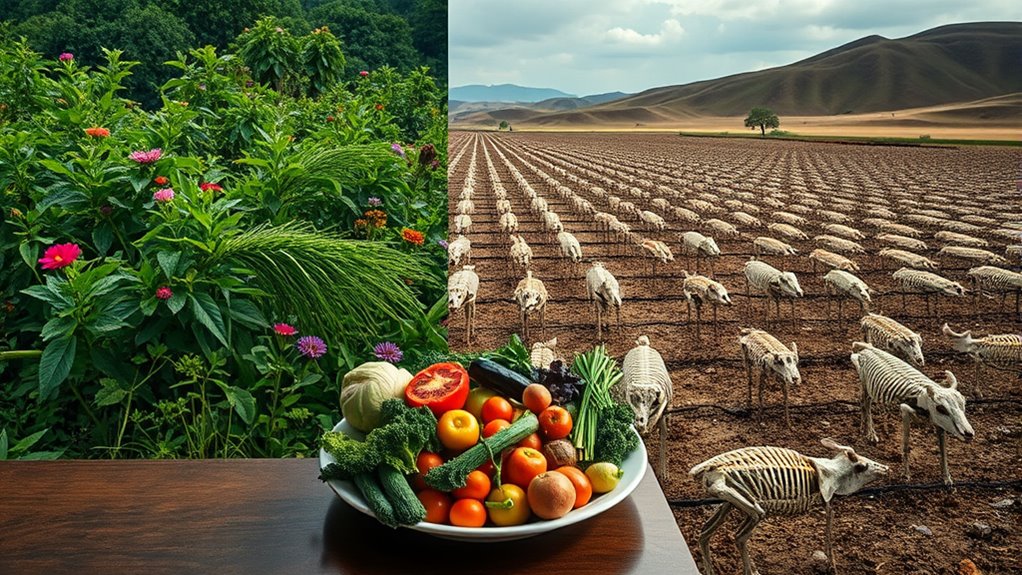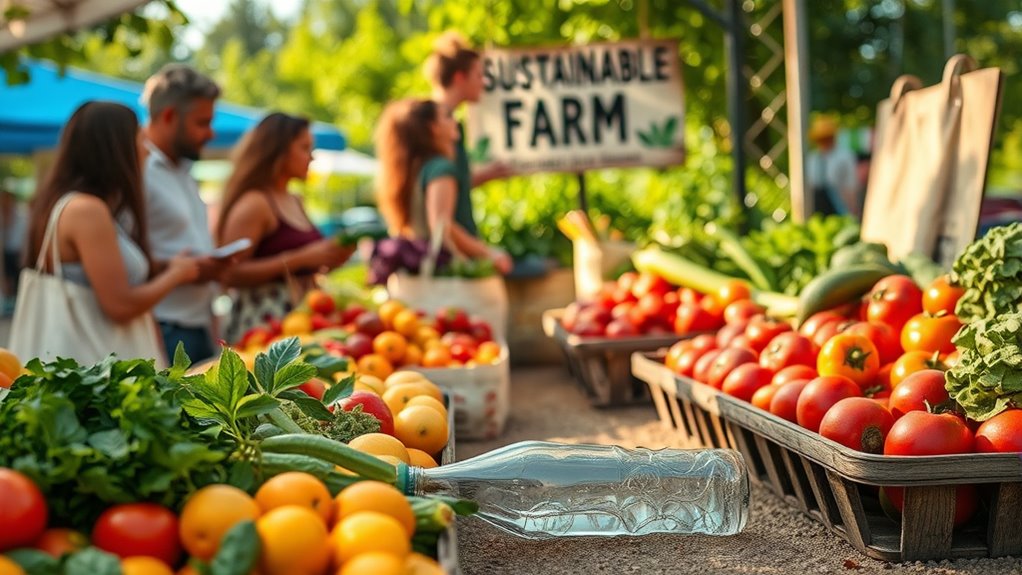Your diet significantly impacts the environment, influencing greenhouse gas emissions and land use patterns. Diets high in animal products, especially beef, contribute to around 25% of global emissions and lead to land and biodiversity loss. Plant-based foods, on the other hand, produce far less emissions and support sustainability. By making conscious dietary choices, you can help reduce your ecological footprint. Discover more about how your food choices can shape a sustainable future.
Key Takeaways
- Diets rich in animal products, especially beef, significantly increase greenhouse gas emissions compared to plant-based foods.
- Agricultural expansion for livestock contributes to habitat destruction, biodiversity loss, and soil erosion, threatening ecosystems.
- Fertilizers and pesticides used in farming lead to water pollution, contaminating waterways and harming aquatic life.
- Adopting plant-based or vegan diets can reduce carbon footprints and food production emissions by up to 70% by 2050.
- Consumer awareness of sustainable eating is growing, but gaps between intentions and actions remain influenced by socioeconomic factors.
Greenhouse Gas Emissions From Different Diets

When you consider your dietary choices, it's essential to recognize their significant impact on greenhouse gas emissions. Food production contributes to around a quarter of global emissions, with animal-based foods like beef and cheese having much larger carbon footprints. For instance, producing just one kilogram of beef emits about 60 kilograms of CO2-equivalents, while cheese emits around 21 kilograms. In contrast, plant-based foods can emit 10 to 50 times less. Additionally, adopting plant-based diets can lead to substantial reductions in overall carbon footprints, promoting environmental sustainability. The shift to a vegan lifestyle can further enhance these benefits by reducing reliance on high-emission animal products. A plant-based diet also supports weight management and encourages healthier eating habits, which can contribute to a lower environmental impact. Incorporating chia seeds into your meals can enhance digestive health while also providing a nutrient-dense food option that aligns with environmental goals.
Land Use and Its Environmental Impact

Your dietary choices not only influence greenhouse gas emissions but also have a direct impact on land use. Since 1960, nearly a third of the world's terrain has changed due to agricultural expansion, leading to deforestation and habitat loss.
You mightn't realize it, but half of the world's habitable land is now dedicated to agriculture, making it the largest land user. Intensive farming practices contribute to soil erosion and biodiversity loss, while urbanization creates impervious surfaces that disrupt local ecosystems.
Water Pollution and Agricultural Practices

Although agricultural practices are essential for food production, they often lead to significant water pollution issues. Runoff from farms carries nitrogen-rich fertilizers and toxic pesticides into waterways, causing eutrophication and harming aquatic life. The use of best management practices can significantly reduce the negative impact of these agricultural practices on water quality. Additionally, implementing advanced directives can help ensure that agricultural policies prioritize environmental health for future generations. Furthermore, applying innovative practices in agricultural techniques can enhance sustainability and reduce pollution.
When livestock waste isn't managed properly, it contaminates both surface and groundwater. Furthermore, improper irrigation can result in erosion, increasing nutrient runoff. Stream bank modifications can reduce vegetation, exacerbating pollution.
These practices create "dead zones" that threaten aquatic ecosystems and compromise water quality. To combat these effects, implementing riparian buffers, organic farming, and best management practices is crucial. Additionally, the tea industry's shift towards sustainable practices can help mitigate these environmental impacts by reducing chemical runoff.
Biodiversity Loss Linked to Meat Consumption

As the global demand for meat continues to rise, biodiversity faces unprecedented threats, with agricultural practices directly contributing to the alarming rate of species extinction.
The current extinction rate is now higher than it's been in the last 10 million years, largely due to land use for livestock. Over three-quarters of the land cleared in the Amazon serves livestock and feed crops.
Specifically, red meat, especially beef, requires extensive land, further exacerbating the issue. This expansion impacts biodiversity hotspots in regions like South America, Africa, and Asia. Additionally, the production of hydrogen from renewable sources offers a sustainable alternative to fossil fuels, which could help reduce the environmental impact of traditional agricultural practices. Furthermore, the deforestation associated with livestock farming eliminates critical carbon sinks, worsening climate change and further threatening biodiversity. Engaging in meaningful connections related to environmental initiatives can promote awareness and inspire collective action against these pressing issues. The increasing demand for lightweight foundations in cosmetic products reflects a broader trend toward sustainability and a more responsible approach to consumption.
Nutritional Quality and Sustainability of Diets

When considering the nutritional quality of diets, it's essential to recognize how sustainable choices can enhance health while minimizing environmental impact. Adopting a vegan or Mediterranean diet often leads to higher nutritional quality, thanks to their rich supply of vital nutrients. By incorporating plant-based proteins like legumes and beans, you can obtain essential nutrients such as protein, iron, and zinc, promoting better health. Additionally, a well-planned vegan diet ensures you receive adequate essential fatty acids, which are crucial for overall health. Including chia seeds in your meals can also provide additional fiber and omega-3 fatty acids, supporting weight loss and overall wellness.
Sustainable diets prioritize fiber, vitamins, and minerals, which support overall well-being. While you might face challenges in obtaining certain micronutrients like vitamin B12 or calcium, the benefits of a diet low in environmental impact far outweigh these concerns. Additionally, including baked kale in your meals can boost your intake of antioxidants and essential vitamins.
Ultimately, aligning your food choices with sustainability can lead to improved health outcomes and a healthier planet.
The Role of Meat in Environmental Degradation

The production of meat significantly contributes to environmental degradation, impacting our planet in multiple ways.
Livestock farming is responsible for about 18% of all greenhouse gas emissions, with cows alone producing substantial methane. This sector occupies over 30% of global land, leading to massive deforestation and habitat loss, particularly in sensitive areas like the Amazon. Furthermore, the reliance on renewable energy sources in alternative systems, such as geothermal heat pumps, can help mitigate some of the environmental impacts associated with meat production. The chronic feelings of emptiness experienced by some individuals with BPD may lead to impulsive behaviors like excessive consumption, including high meat diets, which can further exacerbate environmental issues. Additionally, the use of energy-efficient technology in various sectors can play a crucial role in reducing our overall carbon footprint.
Water usage is another concern; meat production strains freshwater resources and pollutes water bodies with harmful substances. Additionally, the expansion of livestock farming drives biodiversity loss, threatening numerous species.
As a consumer, being aware of these impacts can help you make informed choices about your diet and its effects on the environment. Reducing meat consumption is one way to lessen your ecological footprint. Furthermore, adopting energy-efficient systems like heat pumps can contribute to a more sustainable lifestyle by reducing overall greenhouse gas emissions.
Benefits of Plant-Based Diets for Sustainability

Embracing a plant-based diet not only benefits your health but also plays a crucial role in promoting environmental sustainability. By reducing your consumption of animal products, you significantly lower greenhouse gas emissions, with vegan diets cutting carbon dioxide emissions by up to 50%. This shift could potentially reduce food production emissions by up to 70% by 2050. Additionally, plant-based diets consume less water—up to 13 times less—and require 18 times less land than meat-based diets, helping to mitigate deforestation and preserve biodiversity. Incorporating meal replacement juices can also enhance your nutrient intake while maintaining sustainability. Chia seeds, for instance, are a nutrient-dense option that provides essential minerals and fiber beneficial for a balanced diet. Historically, chia seeds were recognized for their high nutritional value and served as a staple food in ancient Mesoamerican diets.
You also contribute to resource efficiency and generate less waste, supporting cleaner environments. Ultimately, adopting a plant-based diet fosters sustainable food systems that protect our planet for future generations. Furthermore, choosing eco-friendly practices in your cooking and food preparation can further enhance your positive impact on the environment.
Regional Variability in Food Production Impact

While agricultural practices vary widely across regions, their environmental impacts can significantly influence global sustainability efforts.
Agricultural practices differ across regions, yet their environmental impacts play a crucial role in shaping global sustainability initiatives.
You mightn't realize that agriculture consumes about 70% of the world's freshwater, with water management practices differing greatly depending on regional climate.
Land use also varies, as half of habitable land is dedicated to agriculture, leading to different levels of habitat destruction.
Additionally, food production contributes around 26% of global greenhouse gas emissions, heavily influenced by local livestock and crop choices.
Eutrophication, driven by fertilizer use, varies regionally and affects local ecosystems. Furthermore, the shelf life of freshly squeezed juices can be impacted by local agricultural methods, affecting waste and sustainability in food production.
Dietary Choices and Their Policy Implications

Understanding the environmental impacts of food production naturally leads to examining how our dietary choices shape policy decisions. Your food habits directly influence greenhouse gas emissions, land use, and water consumption.
Diets rich in animal products significantly contribute to climate change and resource depletion. Policymakers can respond by implementing regulations to limit high-impact foods and offering economic incentives for sustainable options.
Public awareness campaigns can promote the health and environmental benefits of plant-based diets, encouraging you to make informed choices. Moreover, incorporating sustainability into national dietary guidelines can foster healthier eating habits.
Ultimately, aligning dietary choices with responsible policies can pave the way for a more sustainable future, benefiting both your health and the planet.
Consumer Awareness and Sustainable Eating Practices

As consumers become more aware of the environmental impacts of their food choices, the demand for sustainable eating practices is on the rise. About 60% of you recognize the importance of sustainable food production, and 72% express a desire to adopt these practices.
However, there's often a gap between intentions and actions. Factors like income and education influence your ability to choose sustainable diets, while Gen Z is particularly aware of the benefits of plant-based eating.
To bridge this gap, raising awareness and providing clear, evidence-based messages about sustainable eating are crucial. By engaging in community initiatives and supporting equitable food systems, you can contribute to a healthier planet and your well-being.
Frequently Asked Questions
How Does Food Transportation Affect My Diet's Environmental Impact?
Food transportation significantly affects your diet's environmental impact.
When you choose imported fruits and vegetables, you contribute to higher greenhouse gas emissions, especially if they require air freight.
Opting for locally sourced and seasonal produce reduces transportation distances and lowers emissions.
What Are the Environmental Effects of Processed Plant-Based Foods?
Processed plant-based foods, while convenient, can have significant environmental effects.
You may find that their production involves higher energy consumption and water usage compared to whole foods. Additionally, they often require more resources for packaging and transportation, leading to increased waste.
While they're generally more sustainable than animal products, the environmental footprint of processed options is higher than that of minimally processed foods.
It's essential to consider these factors when making your food choices.
Are There Sustainable Seafood Options for Pescatarians?
If you're looking to indulge in a delightful seafood experience, you've got plenty of sustainable options as a pescatarian.
Consider choosing fish caught through eco-friendly methods like hand lines or traps, which minimize harm to marine habitats.
When you shop, keep an eye out for certifications like MSC and ASC to ensure your selections support healthy fish populations.
Plus, buying local seafood not only tantalizes your taste buds but also fosters community support.
How Can I Reduce Food Waste in a Plant-Based Diet?
To reduce food waste in your plant-based diet, start with meal planning to ensure you use all ingredients.
Get creative by using vegetable scraps for broths or freezing extra herbs.
Organize your pantry so older items get used first, and try improvisational cooking to make meals from what you have.
Compost any scraps you can't use, and consider joining community efforts to share resources and knowledge on minimizing waste effectively.
What Role Do Cooking Methods Play in Environmental Sustainability?
Cooking methods play a crucial role in environmental sustainability. When you choose energy-efficient appliances like microwaves or pressure cookers, you cut down on energy consumption.
Grilling with charcoal or gas can release significant CO2, so opting for cleaner alternatives is better. Also, using clean cooking technologies reduces fuel use and emissions.
Conclusion
In conclusion, your dietary choices significantly influence the environment. Did you know that adopting a plant-based diet can reduce your carbon footprint by up to 50% compared to a meat-heavy diet? By making conscious decisions about what's on your plate, you can help combat climate change, conserve water, and protect biodiversity. So, the next time you're grocery shopping or planning a meal, remember that your choices matter – for your health and the planet's future.









